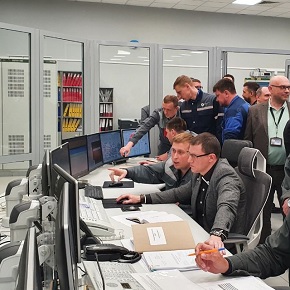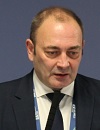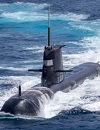 |
||
|
ROSATOM takes part in the Meeting of the Committee on Non-Power Applications of Nuclear Technologies under the IRC MBIR Advisory Board Press Service of IRC MBIR LLC, PUBLISHED 05.06.2023 May 26, 2023, Tashkent, Institute of Nuclear Physics (INP, under the Academy of Sciences of Uzbekistan) hosted a meeting of the Committee on Non-power Applications of Nuclear Technologies under the Advisory Board of the International Research Center Based on the MBIR Reactor (IRC MBIR). The event was attended, both face-to-face and online, by over 40 representatives of the largest Russian and overseas nuclear companies, major scientific and educational institutions of Uzbekistan, Kazakhstan, China, Armenia, Algeria, Brazil and South Africa, in addition to international organizations, such as IAEA and JINR. It was moderated by Vasiliy Konstantinov, Director in International Science and Technology Projects of Rosatom State Atomic Energy Corporation, and concurrently CEO of IRC MBIR LLC. The meeting was kicked off by Uzbek physicist Dr. Bekhzod Yuldoshev, President of the Academy of Sciences of Uzbekistan and a Foreign Member of the RAS. Stepan Kalmykov, Vice President of the Russian Academy of Sciences (RAS), a RAS academician, Scientific Supervisor of the Chemistry Department at Lomonosov Moscow State University and Chairman of the IRC MBIR Advisory Board, replied with a welcoming speech. He said: "Uzbekistan is our strategic partner under the MBIR Project. The IRC MBIR Advisory Board continues to create an international agenda within the promising experimental research program. The unique design features of the MBIR reactor, together with its high power, will provide a fast spectrum and record density of the neutron flux to achieve radiation effects on the study samples of up to 35-40 dpa; this is twice as much as can provide BOR-60 being replaced by MBIR. Research at the MBIR reactor will open doors for multilateral scientific collaborations and ensure a virtually full range of cutting-edge research and commercial technologies for the nuclear industry." Dr. Lachezar Kostov, Doctor of Physics and Mathematics, Vice-Director of the Joint Institute for Nuclear Research (JINR), noted a growing interest in neutron research around the globe and spoke about JINR contribution to major international mega-science projects, including IRC MBIR. "The JINR member countries, such as Russia, Vietnam, Kazakhstan, Uzbekistan and many others, seek to consolidate their joint effort for the use of neutron scattering methods in nuclear physics and condensed matter physics on multiple neutron sources. MBIR infrastructure, including coupled horizontal channels, will open vast opportunities for a wide variety of research. In fact, JINR, in cooperation with IPPE, is preparing to the development of a MBIR coupled channel research program," he said. Ilham Sadikov, Director of the Institute of Nuclear Physics (INP) under the Academy of Sciences of Uzbekistan, gave a talk about the INP main activities related to non-power applications of nuclear technologies, with particular focus on possibilities of exploring the rich cultural heritage of Uzbekistan. "In the near future, INP is going to enter into an Agreement on Accession to IRC MBIR, while the related legally binding terms and conditions were signed in November 2022. Joining IRC MBIR and access to the MBIR reactor will expand the INP scientific capacity and enable various research in nuclear physics, medicine, reactor materials science, and production of radioisotope products. Moreover, MBIR experimental capabilities to study nuclear reactions in stars will justify and check hypotheses and calculations made by Uzbek astrophysicists. High neutron fluxes in the MBIR reactor will help produce new types of radioisotope products, which are physically impossible in other reactors to date," he said. Dmitry Klinov, Deputy Scientific Supervisor for Promising Fields of IPPE, talked about goals and objectives of the MBIR Project and unique experimental capabilities of the research nuclear reactor: "We need to enhance the MBIR Research Program, including through the use of out-of-vessel experimental facilities. Our estimates of the spectrum and the intensity of neutron and γ-quantum beams suggest that we can potentially carry out biomedical studies using the reactor. Beam dimensions make it possible to conduct more complex and comprehensive studies with a potential integral action of other sources of radiation, apart from neutrons and γ-quanta. For this end, in the first place, we need to conceptualize a research program and develop initial technical requirements to premises and additional technical means for the research. In this regard, the calls and meetings of the committees within the Advisory Board is of utmost importance for the future MBIR Project." Andrei Lider, Head of Department and Supervisor of Experimental Physics Division at Tomsk Polytechnic University (TPU), emphasized TPU on-going work in the field of non-power applications of nuclear technologies. "The creation of a 'critical mass' of researchers who can be involved in the MBIR Project is a crucial task for the entire project as a whole, while involvement of students at the construction stage will help secure new talents for the project". Yevgeny Bespala, Acting Vice-Rector for Research and Technology Transfer of TPU, Chairman of the Committee on non-power applications of nuclear technologies under the IRC MBIR Advisory Board, continued with the Committee's Action Plan and summed up the meeting. "Traditionally, meetings of special-purpose committees under the IRC MBIR Advisory Board are of great interest for both Russian and foreign experts in nuclear technologies. The scientific collaboration and the broad discussion of the international program for promising experimental research at the MBIR reactor among prominent nuclear scientists confirm the project's strategic significance for the global nuclear industry," Vasily Konstantinov highlighted. At the end of the meeting, the participants visited the site operated by INP under the Academy of Sciences of Uzbekistan and took a technical tour to see the VVR-SM reactor, State Enterprise "Radiopreparat", an electron accelerator and Co-60 gamma-ray irradiation facility. A multi-purpose fast neutron research reactor (MBIR) is being constructed as part of the comprehensive program "Development of Engineering, Technologies and Scientific Research in the Field of the Use of Atomic Energy in the Russian Federation". The construction site is located in Dimitrovgrad (Ulyanovsk Region) on the basis of RIAR (a company of Rosatom). The MBIR International Research Center (ICR) is being created on the basis of the MBIR Rector. The scientific group will include Russian and foreign scientists and researchers. The activities of the Center are performed by the Consortium - the International Research Center on the basis of the MBIR reactor. The new participants are joining the MBIR project by signing the Consortium Agreement. This is the legal documentation of the parties' relations and defines the participants' rights and obligations for the use of MBIR reactor resource after its commissioning. The Russian and foreign partners get an opportunity to carry out the experiments required for the national programs of peaceful nuclear power development, without the need of direct ownership of the reactor facility (and related obligations on assurance of the safe operation of the plant, nuclear materials control and accounting, financial and legal obligations). Such approach provides an opportunity for the flexible use of the reactor resource that satisfies the needs of the scientific community. The state and large domestic companies direct resources to the accelerated development of the domestic research, infrastructure, scientific and technological base. The development of international scientific activities makes it possible for Rosatom and its companies to carry out breakthrough research enabling innovation to ultimately strengthen global cooperation and development of both energy and non-power nuclear technologies. Topics: Research reactors, Fast breeders Other news: Main Construction Phase for Unit 3 of El-Dabaa Nuclear Power Plant Commences in Egypt A technical ceremony for the pouring of the first concrete took place. First batch of nuclear fuel was delivered to Akkuyu NPP The leaders of the two countries gave symbolic permission to deliver the first batch. The CARR reactor is open to foreign customers CARR has received more than 40 applications from abroad. |
Hero of the day 
Unit 2 of the Belarusian NPP included the unified energy system of the Republic of Belarus The grid connection at the reactor power of 40% of the nominal one confirms the availability of all its systems and equipment for electricity generation. In the coming days, specialists will increase the reactor power up to 50% and carry out a series of dynamic tests. INTERVIEW
AtomInfo.Ru OPINION
Note Verbale from China to IAEA |

